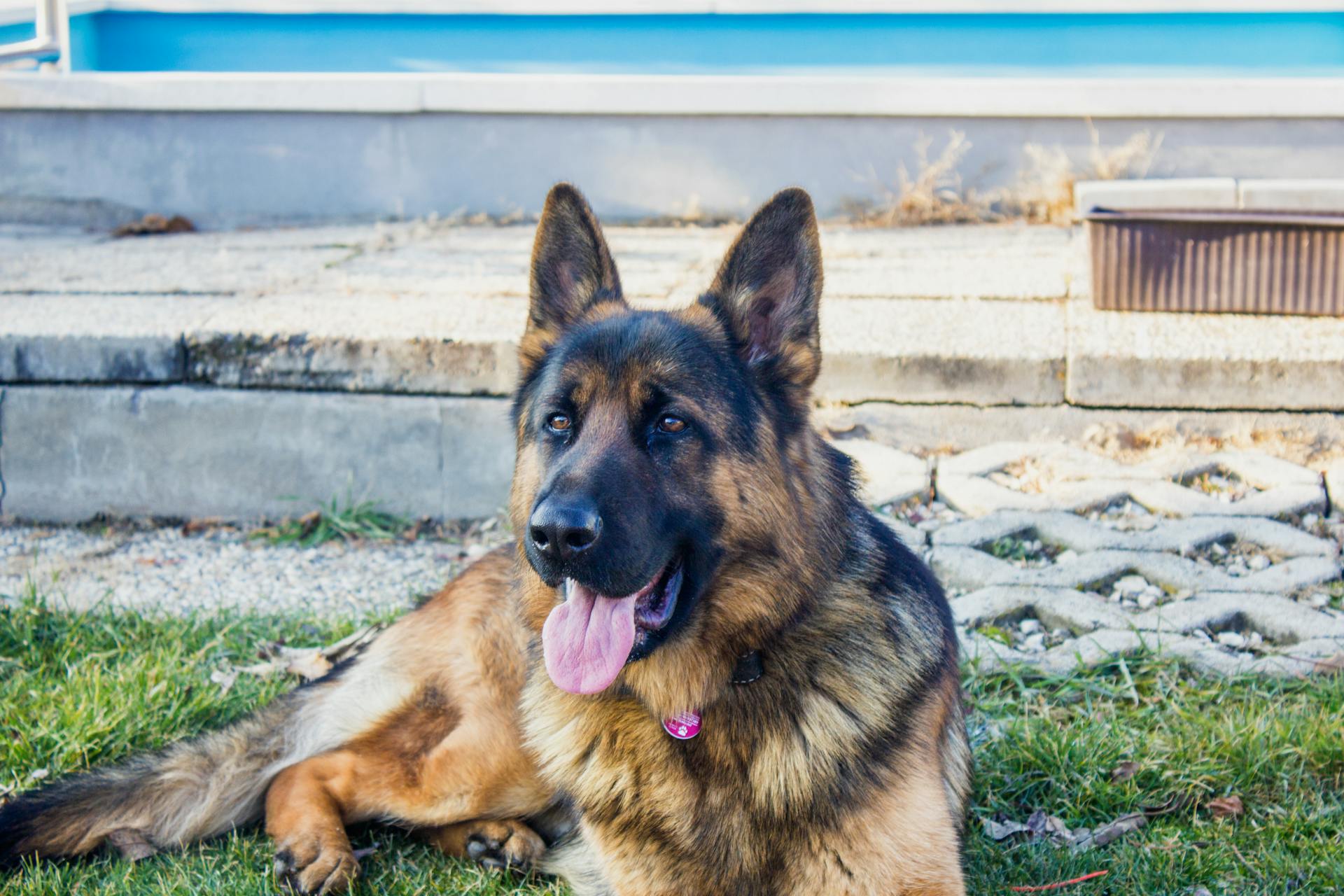
German Shepherds are prone to stomach problems, which can be caused by a variety of factors including eating too quickly, gobbling food, and swallowing air.
Eating too quickly can lead to swallowing air, which can cause stomach problems in German Shepherds.
Gobbling food is a common behavior in German Shepherds, especially if they're fed in a stressful environment.
Feeding a high-protein diet can also contribute to stomach problems in German Shepherds.
A German Shepherd's stomach is sensitive and can be easily upset by changes in their diet or environment.
Preventing stomach problems in German Shepherds requires a combination of proper feeding habits, a healthy diet, and a stress-free environment.
A different take: Dog Stomach Noises
Causes and Prevention
Bloat is a serious condition that can affect German Shepherds, and it's essential to understand the causes and prevention strategies. Bloat can occur at any age, but it's most common in middle-aged dogs, and large breed dogs with deep chests are at higher risk.
Risk factors for bloat include eating very quickly, overeating, drinking a large quantity of water in a short period of time, and exercising after eating. German Shepherds are prone to bloat due to their deep chests and high "height to width ratio".
Preventative measures can be taken to reduce the risk of bloat. Feeding smaller meals more frequently and restricting activity for 1-2 hours after meal time can help. It's also essential to avoid using raised food bowls and not letting your dog drink a large amount of water all at once.
A gastropexy is a surgical procedure that can help prevent bloat by attaching the stomach to the abdominal wall. This procedure can be performed laparoscopically and can help reduce the severity of bloat if it occurs.
Here are some common causes of bloat in German Shepherds:
- Eating very quickly
- Overeating
- Drinking a large quantity of water in a short period of time
- Raised food bowls
- Stress and anxiety
- Exercising after eating
- Genetic factors
By being aware of these risk factors and taking preventative measures, you can reduce the likelihood of your German Shepherd experiencing bloat.
Signs and Symptoms
Recognizing the signs and symptoms of stomach problems in German Shepherds is crucial for their well-being and comfort. Observing your pet closely for any signs of gastrointestinal distress is essential.
A swollen or distended abdomen can be a sign of bloat, a life-threatening condition that requires immediate attention. Excessive drooling, panting, or rapid breathing can also indicate bloat or other stomach issues.
Some common symptoms of a sensitive stomach in German Shepherds include vomiting, diarrhea, flatulence, and a noticeable change in appetite. These symptoms can be accompanied by lethargy, abdominal pain, and frequent attempts to eat grass, which often indicates nausea.
Irregular bowel movements, frequent hiccupping, and alterations in eating habits can also be indicators of a sensitive stomach. Grumbling stomach noises and swollen abdomen can also signal underlying stomach issues.
Here are some emergency symptoms to watch out for:
- Refusing to eat or drink anything
- Excessive vomiting
- Vomiting blood
- Repeatedly retching without throwing up
- Diarrhea with blood in it
- Trying to poop with a lot of effort, but no feces passed
- Lethargy, listlessness, or a significant drop in energy
- Fearfulness, aggression, or other unusual behaviors
These symptoms can signal underlying health issues that require immediate attention from a veterinarian.
Treatment and Recovery
If your German Shepherd is experiencing stomach problems, it's essential to seek veterinary care as soon as possible to increase their chances of survival. The severity of the case determines the treatment recommendation, with non-surgical treatment possible for dogs that are bloated without volvulus.
Veterinarians at VMC aim for rapid confirmation of diagnosis, attending to patient comfort, and rapid stabilization and preparation for surgery. They can diagnose and get your dog in a comfortable state in a matter of minutes, allowing for an educated decision about proceeding with surgery.
Surgery is required to untwist the stomach and return it to its appropriate position, and a gastropexy is also performed to prevent twisting of the stomach if bloat occurs again. The success rate of preventing the recurrence of a GDV is 95%.
For another approach, see: Anatomy of Canine Stomach
Treatment of Gas
Seeking treatment for GDV as soon as possible is crucial to increase the dog's chance of survival.
The severity of the case determines the treatment recommendation for the affected dog, with dogs that are bloated without volvulus normally being treated non-surgically.

Rapid confirmation of diagnosis and attending to patient comfort are key at the VMC, where they aim to have dogs diagnosed and in a comfortable state in a matter of minutes.
Surgery is required to untwist the stomach and return it to its appropriate position, and also allows the veterinarian to assess the amount of damage caused by the lack of blood flow due to the twisted stomach.
In extreme cases, there may be too little live tissue to salvage, but with appropriate pre-surgical diagnostics, pet owners can be informed of this risk in most cases prior to pursuing surgery.
A gastropexy is also performed during the surgical procedure, which involves suturing the stomach to the abdominal wall to keep the stomach in place and prevent twisting.
The success rate of preventing the recurrence of a GDV with a gastropexy is 95%, and it's recommended for all giant breeds and other at-risk breeds to have a preventive gastropexy performed.
Intriguing read: Different Types of German Shepherd Dogs
Recovery Timelines

Recovery timelines can be unpredictable, but understanding what to expect can help you navigate the process with your German Shepherd.
Recovery timelines for German Shepherds with sensitive stomachs can vary from a few days to several weeks, depending on the severity of the condition and the effectiveness of the treatment plan.
In minor stomach upsets, you might witness a substantial improvement within a few days, with your dog returning to their normal eating patterns and displaying an uplifted spirit.
The road to recovery may be longer and span several weeks for more severe cases, and can extend further if underlying health conditions contribute to sensitive stomach issues.
Factors that can influence recovery timelines include the age of your dog and the treatments or dietary changes implemented.
A nurturing environment, patience, and unwavering support are essential during the recovery phase.
Here are some general guidelines to keep in mind:
By understanding these recovery timelines and being patient, you can help your German Shepherd return to their lively and energetic self.
Signs of Recovery

Signs of recovery in your German Shepherd include stabilized bowel movements, a return to regular eating patterns, increased energy, and a visibly happier demeanor.
A significant marker of recovery is the normalization of bowel movements and a revived appetite, where they show keen interest in their meals once again.
You'll notice a noticeable increase in energy levels and a willingness to engage in physical activities, which are promising signs of a dog recuperating well from stomach ailments.
A brighter demeanor, with your dog showcasing a wagging tail and perky ears, indicates comfort and happiness.
Regular check-ups with your vet can help monitor their recovery process more effectively and adjust their diet or treatment plan, ensuring a steady path to full recovery.
Section 3: Dietary Management
Dietary management is a crucial aspect of managing stomach problems in German Shepherds. The goal is to identify and avoid potential irritants that can exacerbate stomach sensitivity.
Artificial additives, such as those found in many commercial dog foods, can be particularly problematic. Flaxseed oil and fish oil are two examples of fatty acids that can help alleviate digestive issues.
To transition your German Shepherd to a new diet, it's essential to do so gradually, over a period of 7-10 days. This allows the digestive system to adjust to the new food, reducing the risk of adverse reactions.
A well-planned diet should include high-quality, digestible proteins, such as lean meats like turkey or fish. Probiotics, found in foods like yogurt or kefir, can also help foster a healthy gut environment.
Fiber-rich vegetables, such as sweet potatoes and pumpkins, can aid in digestion, while grain-free options can minimize the chances of food sensitivity. Hydrating foods, like those with high water content, can also help prevent dehydration.
Here is a summary of recommended foods for dietary adjustments:
Remember, a tailored diet can work wonders in alleviating symptoms and promoting a happy, active lifestyle for your German Shepherd.
Medications and Consultation
Medications for German Shepherds with sensitive stomachs can vary, but it's essential to consult a vet to identify the best options, including probiotics, antacids, or specialized gastrointestinal formulas.
A veterinarian can recommend suitable medications based on a thorough assessment of the dog's health profile. Statistics reveal that many pet owners are turning towards probiotics to help manage their pets' sensitive stomachs, with a report published in the Journal of Veterinary Internal Medicine showing their effectiveness in managing gastrointestinal issues in dogs.
To assist you in your research, here is a list of ten medications that are commonly recommended for dogs with sensitive stomachs:
Remember to administer these medications under a veterinarian's guidance to ensure your pet's safety and well-being.
Recommended
If your German Shepherd has a sensitive stomach, it's essential to choose the right food to help alleviate symptoms. Recommended foods include hypoallergenic formulations with lean proteins like turkey and fish.
These lean proteins are crucial for muscle development and should be the primary focus when selecting a food for your German Shepherd. Hypoallergenic formulations also help reduce the risk of sensitivities.
Easily digestible carbohydrates like sweet potatoes and brown rice are also beneficial for a sensitive stomach. These carbohydrates provide energy without putting a strain on the digestive system.
Fiber-rich vegetables like pumpkin and beet pulp can also help facilitate smoother digestion. However, it's crucial to avoid foods that have a history of causing sensitivities in German Shepherds.
Here are some of the best dog food brands known for catering to dogs with sensitive stomachs:
Always consult with a veterinarian before making any changes to your German Shepherd's diet, as they can provide tailored advice based on their specific health condition and needs.
Medications and Vet Consultation
Navigating the complexities of medications and vet consultations for your German Shepherd requires a thoughtful approach. A vet consultation is crucial in determining the best course of action for your dog's sensitive stomach.
Veterinarians can recommend suitable medications based on a thorough assessment of the dog's health profile. Statistics reveal that many pet owners are turning towards probiotics to help manage their pets' sensitive stomachs.
Medications for German Shepherds with sensitive stomachs can vary, but probiotics are a common recommendation. Probiotics have been shown to manage gastrointestinal issues in dogs effectively, according to a report published in the Journal of Veterinary Internal Medicine.
To consider medication, it's essential to consult a vet to identify the best options, including probiotics, antacids, or specialized gastrointestinal formulas. A list of common medications for dogs with sensitive stomachs includes:
A vet visit becomes necessary when your German Shepherd exhibits severe symptoms such as chronic diarrhea, repeated vomiting, blood in stool, or lethargy.
Tips for Managing
Managing a German Shepherd's stomach problems requires a balanced diet, regular vet check-ups, and attention to their reactions to different foods. A balanced diet rich in necessary nutrients and devoid of potential irritants is vital.
Incorporating a variety of nutrients without overwhelming the digestive system is key. This means choosing premium quality foods known for their high digestibility.
Regular vet check-ups are essential in monitoring their health and adjusting their diet and lifestyle. Being vigilant about your dog's reactions to new foods can provide valuable insights into what suits their digestive system the best.
Here are some tips for managing a German Shepherd's stomach problems:
- Balanced Diet: Incorporate a variety of nutrients without overwhelming the digestive system.
- Observation: Be vigilant about your dog's reactions to new foods.
- Gradual Transition: When changing diets, do it gradually to prevent stomach upsets.
- Hydration: Always ensure that your dog has access to fresh water, especially during episodes of diarrhea or vomiting.
- Exercise: Regular physical activity can aid in maintaining a healthy digestive system.
- Quality Food: Choose premium quality foods known for their high digestibility.
About 56% of pet owners have noticed an improvement by shifting to a high-quality, grain-free diet. Regular monitoring and timely veterinary check-ups can help adjust the dietary plan as needed.
Maintaining a consistent feeding schedule where your dog eats simultaneously daily can regulate their digestive system and potentially lessen the symptoms of a sensitive stomach.
Health Issues and Diagnoses
German Shepherds can experience a range of stomach problems, including vomiting, constipation, and diarrhea.
These symptoms can be caused by various issues, such as Exocrine Pancreatic Insufficiency (EPI), a condition where the pancreas doesn't produce enough digestive enzymes. EPI is especially common in German Shepherds and can lead to overeating, weight loss, and diarrhea.
Consider reading: Can Too Much Water Cause Diarrhea in Dogs
In some cases, stomach problems in German Shepherds may be linked to inflammatory bowel disease (IBD), a condition that causes inflammation in the digestive tract. IBD can be tricky to diagnose, as its symptoms are similar to those of other disorders.
Stomach aches can also cause unusual behavior in German Shepherds, such as low energy, a depressed mood, or a change in appetite. If you suspect your German Shepherd has stomach problems, it's essential to consult with a veterinarian to determine the underlying cause.
Breed Susceptibility
German Shepherds are notoriously prone to stomach issues due to their genetic predisposition. This is a concern that's been substantiated by various studies and clinical observations.
Their breeding history, where emphasis was placed on enhancing certain traits, inadvertently affected their digestive system's resilience.
A sizable proportion of German Shepherds encounter stomach issues at least once in their lifespan, according to data collected from the German Shepherd Health Project.
Gastrointestinal concerns rank high among this breed's health issues, making it essential for owners to be vigilant about their diet and digestive health.
A well-balanced diet, supplemented with probiotics, can significantly assist in maintaining the gut health of German Shepherds, as recommended by veterinary experts like Dr. Adrian Johnson.
Regular health screenings and timely veterinary consultations are crucial in preempting potential stomach complications, helping to alleviate the frequency and severity of stomach issues.
Consider reading: Health Problems for Miniature Schnauzer
Inflammatory Disease
Inflammatory bowel disease (IBD) is a condition that affects the digestive tract of dogs, including German Shepherds. It's a group of conditions that can cause symptoms like diarrhea, constipation, appetite changes, and weight loss.
IBD can be caused by food sensitivities and allergies, which can lead to inflammation in the digestive tract. This inflammation can cause symptoms that can be challenging to diagnose.
German Shepherds may be more susceptible to IBD due to their breed characteristics. IBD can affect dogs of all ages, genders, and breeds, but it's often seen in middle-aged to older dogs.
Symptoms of IBD can be similar to other digestive disorders, making it difficult for owners and veterinarians to diagnose. If you suspect your German Shepherd has IBD, it's essential to consult a veterinarian for proper diagnosis and treatment.
In some cases, IBD can be managed with dietary changes, medications, or lifestyle modifications. However, in severe cases, it may require more aggressive treatment.
Here are some common symptoms of IBD in German Shepherds:
- Diarrhea
- Constipation
- Appetite changes
- Weight loss
- Abdominal pain
- Vomiting
If you're experiencing any of these symptoms with your German Shepherd, it's crucial to consult a veterinarian for proper diagnosis and treatment.
A veterinarian can help determine the underlying cause of your German Shepherd's symptoms and develop a treatment plan to manage the condition. With proper care and treatment, many dogs with IBD can lead happy and healthy lives.
Gastric Dilatation-Volvulus (GDV)
Gastric Dilatation-Volvulus (GDV) is a serious condition that can be fatal if left untreated. It occurs when a dog's stomach fills with gas, food, or fluid and subsequently twists.
This twisting and flipping of the stomach creates a life-threatening condition for your dog, putting pressure on surrounding organs and decreasing blood flow to and from these organs. The twisted stomach completely obstructs blood supply to major organs and can impact blood flow throughout the body, resulting in shock.
A true GDV requires surgical treatment for your dog to survive. There is no conservative or "wait and see" approach that will prevent pain, suffering, and eventual death.
GDV can progress quickly and without warning, making it essential to monitor your dog closely for signs of bloat. If you suspect bloat, call your veterinarian or nearest veterinary emergency facility immediately.
Here are some breeds that are at high risk for GDV:
Preventive gastropexy is a recommended surgery for high-risk breeds to prevent expensive emergency surgery with a compromised pet. Many pet insurance companies also provide coverage for this preventive surgery.
Pancreatic Enzyme Insufficiency
Pancreatic Enzyme Insufficiency is a serious health issue that affects German Shepherds. It's a non-curable condition that can cause severe weight loss and diarrhea.
This condition is exclusive to German Shepherds and is often accompanied by diarrhea and weight loss. It's diagnosed by blood test and requires ongoing treatment.
To manage Pancreatic Enzyme Insufficiency, your German Shepherd will need to take prescribed digestive enzymes with every meal. These enzymes will help supplement a specific diet that's designed to meet their nutritional needs.
Maintenance care for this condition can be expensive, and it's expected to affect your dog's lifespan.
Frequently Asked Questions
What is a stomach flip in German Shepherds?
Gastric dilatation-volvulus (GDV), also known as "bloat," is a life-threatening condition where a dog's stomach twists and fills with gas, food, or fluid. German Shepherds, like other breeds, are at risk of developing GDV, which requires immediate veterinary attention.
What is the best dog food for German Shepherds with sensitive stomachs?
For German Shepherds with sensitive stomachs, a high-quality dog food with balanced nutrition, such as Purina Pro's sensitive stomach formula, is a great option. This formula provides the necessary care for a delicate tummy.
Sources
- https://vmccny.com/gastric-dilatationvolvulus-bloat/
- https://gsdcolony.com/blogs/news/do-german-shepherds-have-sensitive-stomachs
- https://www.shepherdsense.com/german-shepherd-stomach-problems-and-issues/
- https://vcahospitals.com/know-your-pet/gastroenteritis-in-dogs
- https://magsr.org/content/gsd-health-issues
Featured Images: pexels.com


